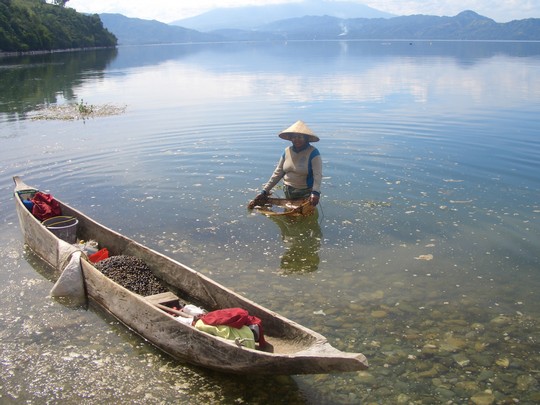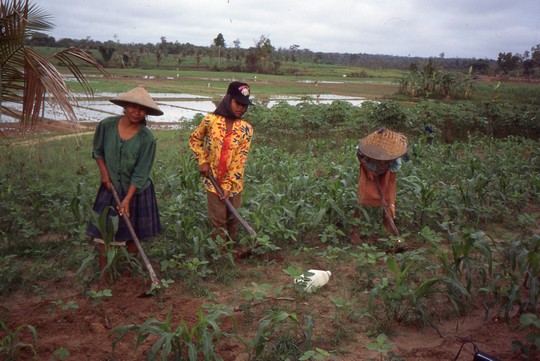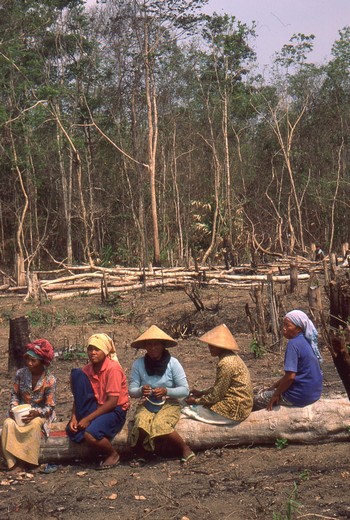As Indonesia’s rural poor are increasingly threatened by dispossession, is it time to adopt a more radical agenda for women and the environment?
Rebecca Elmhirst, Inside Indonesia
 |
Fisherwomen are hard-hit by environmental degradation in West Sumatra.Rebecca Elmhirst |
During International Women’s Day this year, women representing four of Indonesia’s leading environmental and agrarian NGOs called for women across the archipelago to unite and demand a more just and environmentally sustainable economic order. In a joint statement, representatives from WALHI (the Indonesian Forum for the Environment), the Indonesian Peasants Union (SPI), Indonesian Green Union (SHI) and People's Coalition for Fisheries Justice (KIARA) argued that as women bear the brunt of environmental problems, it is women who should take the lead in preventing or solving them.
While women’s NGOs have tended to focus on issues such as health, economic empowerment and domestic violence, this statement is indicative of a new effort to link women with environmental and social justice agendas. This new alliance is inspired by the radical values of ecofeminism, according to which the exploitation of women and the environment is inextricably linked to the capitalist economic system. But at the same time this is just one of an array of competing agendas currently being promoted in Indonesia which attempt to connect women with the environment in a variety of ways.
Women and environmental crises
WALHI, SPI, SHI and KIARA’s joint statement echoes successive reports documenting how women have been disproportionately affected by recent natural disasters, including the 2004 Indian Ocean tsunami, the 2006 Java earthquake, the eruption of Merapi and the West Sumatra earthquake, both of which occurred in 2010. Beyond these large-scale and widely publicised disasters, low income women have also had to contend with the effects of climate change including more unpredictable weather events, especially drought and floods.
There is a general consensus that low income women’s vulnerability to these events stems from their role within the household, which involves a close dependence on natural resources. In most parts of rural Indonesia, women are responsible for carting water, collecting firewood and fodder for livestock and for other agricultural activities. The impact of natural disasters and environmental degradation make these activities difficult, if not impossible. Recently, during an exceptionally prolonged dry season, women in Lampung province had to walk long distances to collect water from a borehole owned by a wealthy family in the village, as their usual supplies had dried up.
Nor are low income women in urban areas spared the effects of natural disasters. In coastal cities such as Semarang, women who are employed as domestic workers are responsible for the burdensome additional task of clearing up when floods and tidal surges inundate the houses of their employers.
Including women in environmental management
 |
Women's use of the environment is not the same as decision-making power.Rebecca Elmhirst |
Recognising that women are particularly impacted by environmental degradation and disasters, some activists have argued that this means women need to be included as active participants in environmental management interventions. Proponents of this position argue that it is important to link gender mainstreaming efforts, women’s empowerment and initiatives to bring about more sustainable environmental management.
Recognising women’s prominent role in household water use, water and sanitation programs in particular are starting to make women’s participation a priority objective. But there also continue to be failures in this sector. A recent public works project in East Java constructed water supply tanks some distance from the village, with the result that women were unable to carry water to their homes and had to pay motorbike taxis (ojek) to help them. In this instance failure to consider women’s voices not only compromised the project goal of improving access to water, but also reinforced the women’s status as dependent on men.
Certainly including women’s voices in environmental management interventions is complex. Women often have no power to make key decisions about the resources they use. This partly explains a widely reported lack of engagement by low-income women in natural resource management initiatives in rural areas. Efforts to strengthen women’s empowerment in natural resource projects are further complicated by low-income women’s lack of time to attend meetings or to engage in collective work tasks. And conservative social values make it difficult for them to speak up in public forums, with the result that these women often prefer to leave it to educated, urban-based elite women to speak on their behalf.
Individualising responsibility
One approach to expanding women’s control over environmental resources is to give them individual title to land, based on the premise that formalised access to land gives women greater bargaining power within the household and community. It also opens up women’s access to credit and other forms of state support, which is often conditional on demonstrating control over assets. Although Indonesian laws allow women equal opportunity to obtain land title, in practice land titling schemes that formalise existing arrangements have tended to grant titles in the name of the household head, who is usually male.
In its scheme to grant land title to households in post-tsunami Aceh, the World Bank has sought to address this issue by raising community awareness about women’s land rights and training the National Land Agency (BPN) staff who are responsible for implementing the program. The World Bank claims that around 28 per cent of registrations through the Reconstruction of Aceh Land Administration System (RALAS) scheme have been issued to women, either individually or jointly with their husbands. Noting that securing women’s land rights is important for addressing women’s vulnerability and fundamental to rebuilding sustainable communities, the organisation showcased this project as an example of good practice in addressing gender concerns in disaster risk management.
Attempts to achieve environmental protection through individual, formalised land tenure reflect a neoliberal agenda of individualising responsibility for environmentally sustainable development. The success of this approach depends on ensuring that individuals behave in environmentally friendly ways. It is no coincidence that a large section of the World Bank’s 2009 report, entitled Investing in a More Sustainable Indonesia, is devoted to a discussion of public attitudes towards the environment. According to surveys cited in the report, currently few Indonesians are inspired into either political participation or personal action by environmental protection or conservation values. The report exhorts the importance of fostering greater public awareness about the connections between individual actions and environmental degradation. Women are seen as a lynchpin in environmental behaviour change largely through their domestic role: protecting water and biodiversity, minimising household waste, and as carers and educators of children.
Women and dispossession
 |
Migrant women in Lampung are caught up in land conflicts between local people and plantations.Rebecca Elmhirst |
But such initiatives fail to acknowledge that the most serious environmental problems women contend with stem from Indonesia’s commitment to exploitative economic development. Many of the country’s natural resource challenges reflect a contradiction between environmental protection and the drive for economic growth, which is directly linked to the exploitation of natural resources. Despite the political changes following the departure of Suharto in 1998, natural resources continue to be exploited by elites for political or personal gain. Indonesia’s corrupt environmental governance not only undermines efforts to achieve environmental sustainability but also results in catastrophic impacts for women – and men – in resource-dependent communities.
According to SPI, in 2011 almost 274,000 families were evicted from land they had been cultivating. NGOs point out that these recent dispossessions are associated with the local government’s power to issue concessions to plantation companies, in exchange for lucrative resource exploitation revenue. Many such evictions are legal according to Plantation Law No. 18/2004, which activists argue favours corporate interests and enables the intimidation, forced eviction and criminalisation of farmers.
While whole families are affected by these processes, women’s lack of voice within their communities has made them especially vulnerable to dispossession. Women’s livelihood activities are often the first to be affected by the development of large-scale plantations, which curtails their ability to collect fuel, fodder and foodstuffs from hitherto forested areas. Indeed, the steep rise in numbers of women migrating to become domestic workers overseas is partly attributable to their diminishing prospects in rural areas where large scale commercial agriculture is developing apace.
The marginalisation of women though land conflict is also particularly acute for migrant women in Indonesia’s rural areas. For example, in Lampung province, disputes over land between local communities and plantation companies are further complicated by the large migrant population, many of whom acquired land from local Lampung people, only to later find it had been granted as plantation concessions by the government. In heated conflicts in Lampung’s Mesuji district, migrant women have been particularly vulnerable because they lack access to family support networks and because the communities they have built in the area since the late 1990s have no formal recognition, effectively excluding them from drawing on state resources. They are now caught in the midst of clashes between local communities and plantations over access to land given over to plantation company PT Silva Inhutani. This is just one of many similar cases across Indonesia where people are being displaced from their land, and in which women’s growing vulnerability is of particular concern.
The road ahead
While there is agreement that women are disproportionately affected by disaster and environmental degradation, there is little consensus as to how to address this concern. The process of strengthening women’s voice in environmental initiatives is complex when the pressures of poverty and conservative gender ideologies weigh against women’s active participation. And it is hard to see how extending women’s decision-making in environmental interventions could ever be meaningful when their access to productive resources may be steamrollered by corporate profit-seeking and government-supported environmental exploitation.
Granting land title to women to strengthen their position is an attractive prospect for donors such as the World Bank. It is an approach that fits with the Bank’s commitment to marketisation and its measurability aligns with the audit culture that accompanies some forms of gender mainstreaming. But it is unlikely to provide a route to ecological justice for women. Activists have even suggested that individual tenure contributes to the vulnerability of the poor by exposing them to acquisitive land markets, which are the first step on the slippery slope towards dispossession.
The challenge ahead is to ensure that donor-led efforts to champion gender equity in relation to the environment do not weaken the prospects for achieving ecological justice. At the same time, women’s concerns must be placed centre-stage in mobilising against environmental injustices. The statement issued by women from Indonesia’s leading environmental and agrarian NGOs shows that these issues are now at least starting to be addressed.
Rebecca Elmhirst (r.j.elmhirst@brighton.ac.uk) is Principal Lecturer in Human Geography at the University of Brighton. She has been researching gender and environmental issues in Indonesia for 20 years, working closely with colleagues from universities and NGOs in Lampung. She is co-editor of Gender and Natural Resource Management in Asia (Earthscan).


No comments:
Post a Comment